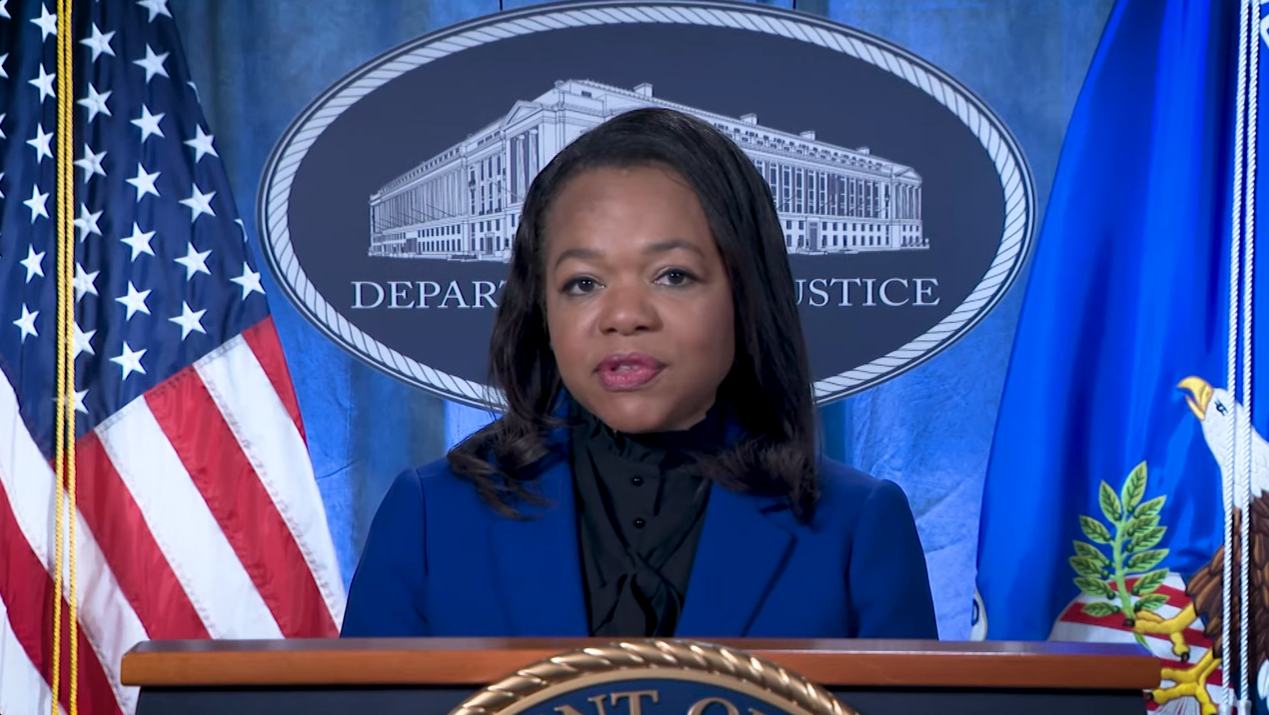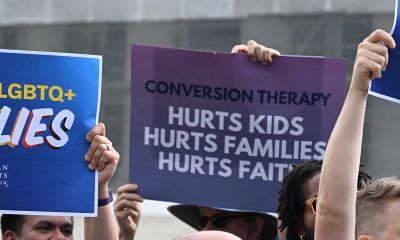U.S. Federal Courts
Federal hate crimes charges filed against Club Q shooter
Anderson Lee Aldrich pleaded guilty to state charges

Assistant United States Attorney General Kristen Clarke of the Justice Department’s Civil Rights Division announced Tuesday federal hate crimes and firearms charges were made against the shooter related to the mass shooting at Club Q, an LGBTQ nightclub in Colorado Springs, Colo., on Nov. 19, 2022.
Anderson Lee Aldrich, 23, is currently housed in a Wyoming prison after pleading guilty to Colorado’s state-level charges in the Club Q shooting, which garnered him a life sentence without the possibility of parole.
Aldrich was moved to the Wyoming State Penitentiary last year according to the Colorado Department of Corrections due to concerns about threats to Aldrich’s safety in Colorado’s prison facilities.
In this latest legal development, the Justice Department entered 50 hate crimes charges and 24 weapons charges — Aldrich used a semiautomatic rifle in the attack. According to the announcement by Clarke, Aldrich filed a notice of disposition and requested that the court schedule a change of plea hearing.
In consultation with the victims of this incident, the parties jointly filed a motion requesting that the U.S. District Court schedule the change of plea and sentencing hearings on the same date, which the court granted.
The parties further informed the court that there is a plea agreement in this matter, and it is anticipated that the defendant has agreed to plead guilty to all charges in the information. The time for the entry of the guilty plea has not yet been set.
Brandon Wolf, the national press secretary for the Human Rights Campaign, in an emailed statement to the Washington Blade reacted to the news saying:
“The attack on Club Q was a horrific act of hate — the kind of anti-LGBTQ+ hate we must work to combat across the country. It matters to have a Justice Department pushing back against hate instead of fomenting it. It matters to have policies like the Matthew Shepard/James Byrd Jr Hate Crimes Prevention Act that protect communities and hold perpetrators accountable. These charges won’t bring back those stolen from their loved ones, but they mark a step toward justice. Our fight to honor the victims and survivors with action continues.”
The court filing charges that Aldrich murdered five people, injured 19 and attempted to murder 28 more in a willful, deliberate, malicious and premeditated attack at Club Q. According to the filing, Aldrich entered Club Q armed with a loaded assault weapon and began firing. Aldrich continued firing until Aldrich was subdued by patrons of the club. The information also alleges that Aldrich committed this attack because of the actual or perceived sexual orientation and gender identity of any person.
During the state court trial in El Paso County Superior Court in Colorado Springs last year, Aldrich identified as nonbinary. El Paso County District Attorney Michael Allen told reporters that he believed Aldrich claimed to be nonbinary to avoid being charged with hate crimes under the state’s laws. There was no indication Aldrich identified as nonbinary before the shooting, the district attorney added.
The FBI Denver Field Office and Bureau of Alcohol, Tobacco, Firearms and Explosives investigated the case.
Maryland
4th Circuit dismisses lawsuit against Montgomery County schools’ pronoun policy
Substitute teacher Kimberly Polk challenged regulation in 2024

A federal appeals court has ruled Montgomery County Public Schools did not violate a substitute teacher’s constitutional rights when it required her to use students’ preferred pronouns in the classroom.
The 4th U.S. Circuit Court of Appeals in a 2-1 decision it released on Jan. 28 ruled against Kimberly Polk.
The policy states that “all students have the right to be referred to by their identified name and/or pronoun.”
“School staff members should address students by the name and pronoun corresponding to the gender identity that is consistently asserted at school,” it reads. “Students are not required to change their permanent student records as described in the next section (e.g., obtain a court-ordered name and/or new birth certificate) as a prerequisite to being addressed by the name and pronoun that corresponds to their identified name. To the extent possible, and consistent with these guidelines, school personnel will make efforts to maintain the confidentiality of the student’s transgender status.”
The Washington Post reported Polk, who became a substitute teacher in Montgomery County in 2021, in November 2022 requested a “religious accommodation, claiming that the policy went against her ‘sincerely held religious beliefs,’ which are ‘based on her understanding of her Christian religion and the Holy Bible.’”
U.S. District Judge Deborah Boardman in January 2025 dismissed Polk’s lawsuit that she filed in federal court in Beltsville. Polk appealed the decision to the 4th Circuit.
U.S. Federal Courts
Federal judge in Md. rules against White House passport policy
Lambda Legal represents transgender, nonbinary people in lawsuit

A federal judge in Maryland on Tuesday ruled in favor of six transgender people who are challenging the Trump-Vance administration’s passport policy.
President Donald Trump once he took office signed an executive order that banned the State Department from issuing passports with “X” gender markers. A memo the Washington Blade obtained directed State Department personnel to “suspend any application where the applicant is seeking to change their sex marker from that defined in the executive order
pending further guidance.”
The Trump-Vance administration only recognizes two genders: male and female.
The lawsuit that Lambda Legal filed in U.S. District Court for the District of Maryland in Baltimore in April alleges the policy “has caused and is causing grave and immediate harm to transgender people like plaintiffs, in violation of their constitutional rights to equal protection.”
Seven trans people — Zander Schlacter, Jill Tran, Lia Hepler-Mackey, David Doe, Robert Roe, Peter Poe, and Kris Koe — filed the lawsuit.
Roe is a U.S. Foreign Service Officer who currently lives in Europe. Lambda Legal, who represents him and the six other plaintiffs, notes Chief Judge George L. Russell III dismissed Roe’s case because the State Department has yet to deny him “an accurate passport.”
“Like every other court that has considered this executive order, the court finds its stated purpose does not serve an important governmental interest that is exceedingly persuasive; further, the discriminatory means employed are not substantially related to the achievement of those objectives,” said Russell in his ruling.
Lambda Legal Counsel Carl Charles described Russell’s decision as “a crucial victory for our clients and transgender people nationwide who have been trapped by this administration’s cruel and discriminatory policy.”
“The court recognized that forcing inaccurate identity documents on transgender Americans causes immediate and irreparable harm,” said Charles in a press release. “Our clients can now travel with dignity and safety while we continue fighting to overturn this discriminatory policy entirely.”
The American Civil Liberties Union earlier this year filed a separate lawsuit against the passport directive on behalf of seven trans and nonbinary people.
A federal judge in Boston in April issued a preliminary junction against it. A three-judge panel on the 1st U.S. Circuit Court of Appeals last week ruled against the Trump-Vance administration’s motion to delay the move.
U.S. Federal Courts
AGs sue White House over push to restrict gender-affirming care in blue states
14 states, DC joined the lawsuit filed Friday

A group of 15 Democratic attorneys general and Pennsylvania Gov. Josh Shapiro (D) have accused the Trump-Vance administration of unlawfully pressuring health providers to withhold access to gender-affirming medicine for minors in places where these treatments remain legal.
In a complaint filed in the U.S. District Court for the District of Massachusetts on Friday, the attorneys general outlined multiple ways in which, they claim, the administration has overstepped its authority to restrict care that is protected under state law, such as by threatening providers with meritless lawsuits and federal investigations.
On the first day of his second term, President Donald Trump directed the Justice Department to pursue enforcement actions to proscribe medically necessary gender related interventions, which were characterized in his executive order as “chemical and surgical mutilation.”
Thereafter, the DOJ has issued subpoenas, demanded private patient data, and suggested that criminal charges might be coming — actions that have no legal basis, and instead constitute efforts to strong-arm Democratic states into alignment with the administration’s position on gender-affirming care for minors, according to the complaint.
As a result of these pressures, the attorneys general argue, providers have reduced or eliminated services while patients have reported cancelled appointments and uncertainty over whether they can continue receiving treatment.
Their lawsuit asks the court to block the administration’s actions and halt the enforcement of the executive order along with another that prohibits the federal government from recognizing transgender people or acknowledging that gender identity does not always correspond with one’s sex at birth.
The 15 attorneys general are from Massachusetts, California, New York, Connecticut, Illinois, Delaware, D.C., Hawaii, Maine, Maryland, Michigan, Nevada, New Jersey, New Mexico, Rhode Island, and Wisconsin.
-

 National5 days ago
National5 days agoTrump falsely links trans people to terrorism
-

 Virginia5 days ago
Virginia5 days agoFellow lawmakers praise Adam Ebbin after Va. Senate farewell address
-

 National5 days ago
National5 days agoLGBTQ activists mourn the Rev. Jesse Jackson
-

 Massachusetts4 days ago
Massachusetts4 days agoEXCLUSIVE: Markey says transgender rights fight is ‘next frontier’




















